|
|
|
|
|
|
|
|
|
|
|
|

When a character is struck
by insanity due to mental attack, <specifically, only Psi
BLAST seems to cause Insanity, if I have that precisely exactly correct>
<?>
curse, or whatever,
you may assign the type
of madness according to the seriousness of the affliction or determine
the affliction randomly using the table below.
Each type of insanity listed
thereon is described in game terms.
As DM you will have to assume
the role of the insane character whenever the madness strikes,
for most players will not
be willing to go so far.
Note that this list is not
so comprehensive as to preclude any +addition+ you
desire --
just be sure that you follow
the spirit of the rules here.
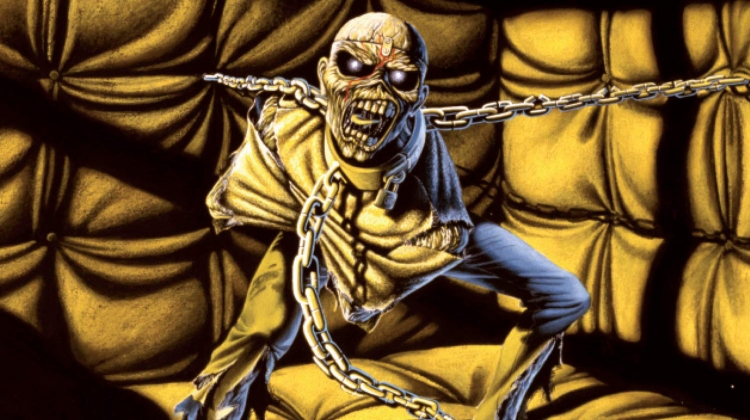
1. dipsomania*
2. kleptomania*
3. schizoid*
4. pathological
liar*
5. monomania
6. dementia
praecox
7. melancholia
8. megalomania
9. delusional
insanity
10. schizophrenia
11. mania
12. lunacy
13. paranoia
14. manic-depressive
15. hallucinatory
insanity
16. sado-masochism
17. homicidal
mania
18. hebephrenia
19. suicidal
mania
20. catatonia
<The following are from OSRIC, pages 126-127>
21.
22.
23.
24.
25.
26
<OSRIC>.
* These mild insanities are subject to psionic attack (see PSlONlC COMBAT TABLES).
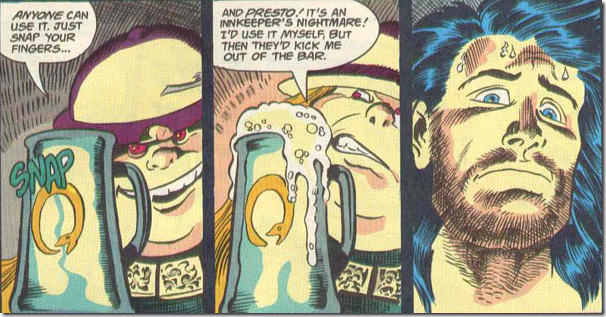
This mild insanity form manifests
itselt periodically.
About once per week, or
whenever near large quantities of alcoholic beverages, the afflicted will
begin drinking excessive quantities of ale, beer, wine, or like spiritous
liquors.
Such drinking will continue
until the character passes out.
It is 50% likely that the
dipsomania will continue when he or she awakens if anywhere near alcohol,
10% likely otherwise
(in which case the individual
will seek to find drink and become violent if denied).
<(see Effects
of Alcohol & Drugs)>
2.
Kleptomania*:
This is another mild insanity form which manifests itself
in an ardent desire, in
this case an uncontrollable urge to steal any
small object
available. The afflicted will furtively pocket small
items,
regardless of their worth,
whenever the opportunity presents itself,
and he II she will usually
seek out such opportunities. There is a 90%
probability of being seen
stealing if the character is being observed.
This desire to take things
is absolutely uncontrollable, and the
the individual will lie
to avoid being prevented the opportunity, or when
caught.
* Kleptomaniac thieves
|| assassins have a -10% on their stealing
ability due to the overpowering
urge to immediately steal an item.

This rather mild insanity
form manifests its effects in a
personality loss. The afflicted
has no personality of his || her own,
so
he || she will select a
role model and make every attempt possible to
become like that character.
Selection will be based upon as different
a person as is possible
with regard to the insane character. Thus an
insane M-U
will begin to follow the habits of a fighter,
for
example, dressing and speaking
like that character and seeking to be
like him or her in all ways.
<d>
4.
Pathological
Liar*: This form of insanity is evident after conversing with
the individual for a short
period of time. The afflicted character will
begin making outrogeous
statements regarding his or her abilities,
possessions, experiences,
or events. Whenever anything important or
meaningful is discussed
or in question, the afflicted can not tell the
truth, and not only will
he or she lie, but do so with the utmost conviction,
absolutely convinced that
the prevarication i s truth.
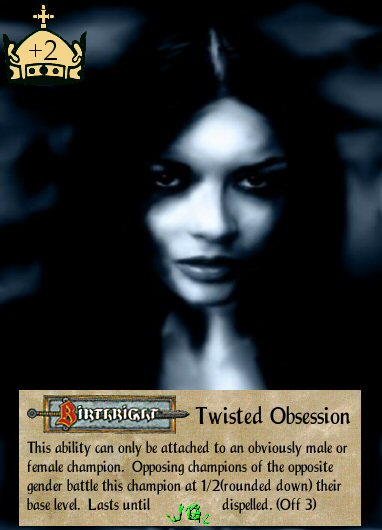
This character will seem
absolutely normal until presented
with an idea, goal, or similar
project which seems promising or
purposeful to him or her.
As of then, the charocter will become
obsessed with the accomplishment
of the purpose. He or she will think
of nothing else, talk of
nothing else, plan and act to accomplish nothing
save the fixed end. The
monomaniac will brook no swerving from
any friend or associate,
and he or she will insist that such individuals
serve the “cause” with the
same devotion that the afflicted character
shows. (Hostility and violence
could result, and certainnly not a little
suspicion and mistrust if
co-operation is not heartfelt. . . ) Once the
desired end has been accomplished,
the insane character will manifest
symptoms of dementia
praecox until a new purpose is found.

The afflicted character will
be quite uninterested
in any undertaking when
suffering from this form of madness.
Nothing will seem worthwhile,
and the individual will be continuolly
filled with lassitude &&
a tremendous feeling of ennui. No matter
how important the situation,
it is 25% probable that the afflicted will
choose to ignore it as meaningless
to him || her.
7.
Melancholia:
Similar to dementia praecox,
this malady makes the afflicted
given to black moods, fits of brooding, and
feelings of hopelessness.
The afflicted will be 50%
likely to ignore any given situation due to a fit of melancholia
coming upon him || her.

With this condition, the
insane character will be absolutely convinced that he || she is the best
at everything: <:>
the smartest=25,
wisest=25,
strongest=25,
fastest=25,
handsomest=30,
<in order, and add one for Cha> <CHA25>
and most powerful character
of his or her profession. <in theory, the character believes that he
is level 20> <make a list of the most powerful characters in each profession>
The afflicted will take
immediate umbrage at any {suggestion} to the
contrary,
and he or she will demand
the right to lead, perform any importont act, make all decisions, etc.
(This one is VERY dangerous.)
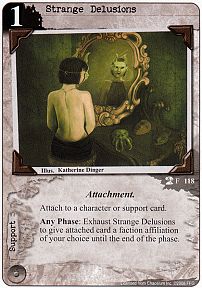
Similar to megalomania,
in this state the deluded
will be convinced that he
or she is a famous figure || monarch,
demi-god,
or similar personage. Those who “fail” to recognize the afflicted
as such will incur great
hostility. In normal affairs, this individual
will seem quite sane, but
the afflicted will act appropriate to
a station which he or she
does not actually have and tend to order
around actual and imaginary
creatures, draw upon monies and items
which do not exist, and
so on.

This form of insanity has
the well-known ”split personality” trait.
From 1 to 4 separate and
distinct personalities can exist in the afflicted -- base the # upon the
severity of the insanity. <NPC 'personality' tables>
Likewise, the difference
from one personality to the next should reflect the severity of the affliction.
Each ”new” personality will
be different in alignment, goals, and preferences.
(A very severe case might
have a different class also but without coincidental
possession, <link: random class table>
<define: severe: 3+?>
the new personality emerging
will not have the actual abilities he or she may think that he or she possesses.)
The onset of schizophrenia
is random, 1 in 6 per day, with a like chance of a new
(or return to the old) personality
emerging.
However, whenever a stress
situation -- decision, attack, etc. -- arises,
the 1 in 6 chance of schizophrenia
striking must be checked every round in which the stress continues.
Q. Can a character
who becomes
schizophrenic due to a psionic
attack,
or other effect, continue
in his or her
class if one of the new
personalities
has an alignment which is
inconsistent
with the character's original
class?
A. In general the
original class is
retained for all the new
personalities
which have a suitable alignment,
and
the original personality
is not affected.
Personalities which have
an
unsuitable alignment will
believe
themselves members of a
different
class. They will not
actually have the
powers of the class concerned,
but
will delude themselves that
they
possess these powers.
In the
case of a Paladin with schizophrenia,
an evil act performed by
one
of the new personalities
would not
lead to loss of class by
the original
personality, because it
has not been
'knowingly performed'.
(Imagine #5)
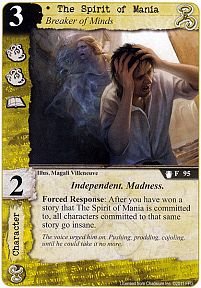
Somewhat like schizophrenia,
this form of insanity strikes
suddenly
(1 in 6 chance per TURN,
lasts 2-12 turns, then 1 in 6 chance per turn of return to normalcy) and
violently.
The afflicted will become
hysterical, enraged, or completely maniacal
(d6 for determination, equal
chances).
The insane character will
shriek, rave, and behave in a violent manner, possessing an 18/50,
18/75,
or 18/00
STR according to the state he or she is in.
(Note that a female can
possess 18/00 STR when afflicted,
as can non-human races otherwise
limited to lesser strengths.)
The maniac is unreasoning
when spoken to, but he or she will possess great cunning.
The afflicted will desire
to avoid or to do something according,
but not necessarily appropriate,
to the situation at hand.
When the maniacal state
passes,
the afflicted will not remember
his || her insane actions and will not believe that he or she is insane.
12.
Lunacy:
This violent && often
homicidal state occurs
whenever the moon is full, or nearly full.
The afflicted character
will generally
behave as one in a maniacal
state, with paranoid,
hallucinatory,
or homicidal tendencies.
When the moon is absent
or in its first || last quarters, the afflicted will be melancholiac.
At other times, he or she
will be relatively normal -- perhaps a bit suspicious
&& irascible.
13.
PARANOIA:
13.
PARANOIA:
13.
PARANOIA:

At
the onset of this derangement, the afflicted becomes
convinced
that "they" are plotting against him || her, spying,
listening,
and, always nearby.
As
the affliction develops over several days,
the
insane character will become convinced that everyone around is part of
this plot.
Conversations
are about him || her,
![]() laughter
laughter ![]() is directed at
him || her,
is directed at
him || her,
and
every action of former {friends} is aimed
at deluding him || her so as to fulfill the "plot".
The
paranoid will be principally concerned about position || goods first,
but
as the insanity advances,
he
|| she will "realize" that the plotters are actually after his or her life.
The
paranoid will evidence signs of increasing suspicion, <gt.12>
take
elaborate precautions with locks, guards, devices, and
food
&& drink. In the later stages of the affliction, he || she will
evidence
highly irrational behavior, hire assassins
to do away with
"plotters",
and even become
homicidal in order to "protect" his or
her
life. Paranoids will trust absolutely no one when the affliction has
ADVANCED,
regarding their former close associates && {friends}
as their worst enemies.
<kill
your friends, before they kill you>
<kill
your family, before they kill you>
<kill,
or, be killed>
This alternating insanity
form causes the afflicted to swing from one state to the other in 1 to
4 day intervals.
When excited, the afflicted
is 90% likely to become maniacal, and when disappointed
or frustrated is 90% likely to become highly melancholic.
Thus, in +addition+ to the
usual 1 to 4 day cycle of mania-depression,
he or she can {jump} from
one state to the other depending on outside stimuli.

This form of malady causes
the afflicted to see, hear, ond otherwise sense things which do not exist.
The more exciting or stressful
the situation, the more likely the individual is to hallucinate.
Common delusions are: ordinary
objects which do not
xist, people neorby or passing
when there are none, voices giving
the afflicted information
or instructions, abilities or form which the
character does not really
have (strength, sex, wings, etc.), threatening
creatures oppearing from
nowhere, etc. It is 50% likely that the insane
individual will behave normally
until stimulated or under stress.
Hallucinations will then
commence and continue for 1 to 20 turns after
the excitement/stress passes.
This form of insanity is
coupled with maniacal urges && behavior.
The afflicted individual
is equally likely to be in a
sadistic || masochistic
phase. In the former, he || she will have an obsessive
desire to inflict pain (and
probably death) upon any living
thing encountered. However,
after so doing, the insane character will
return to a relatively normal
state for 1 to 3 days. Likewise, when in a
masochistic state the afflicted
individual will have an overwhelming
urge to be hurt and will
act accordingly. After so doing, normalcy
returns for 1 to 3 days.
Note that friends and associates do not matter
to the afflicted individual,
nor do enemies.
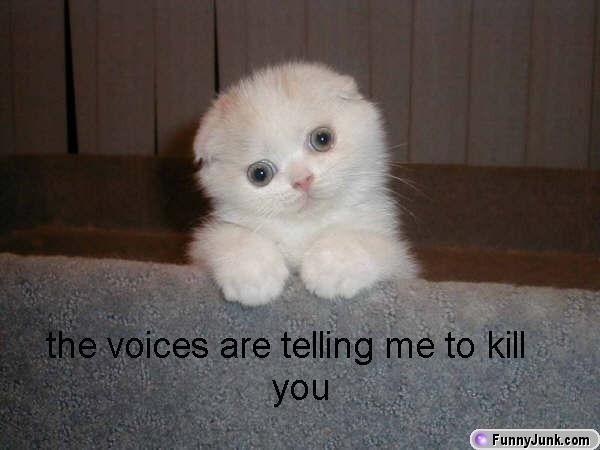
The individual afflicted
with this form of insanity appears absolutely normal.
He II she will behave with
what seems to be complete rationality, and nothing unusual will be noted
regarding
the individual -- except
that he or she will occasionally manifest an
unique interest in weapons,
poisons,
&& other lethal devices. The insanity
form causes the afflicted
to be obsessed with the desire to kill.
This desire must be fulfilled
periodically -- 1 to 4 day intervals.
The victim must be human
(or of the same race as the character if nonhuman).
If prevented from killing,
the frustrated individual will become
uncontrollably maniacal
and attack the first person he or she encounters,
wildly seeking to slay.
After such an occurrence, however,
the afflicted will fall
into a fit of melancholia for 1-6 days before returning
to a homicidal state once
again.
18.
Hebephrenia:
When afflicted by this form of insanity,
the character will evidence
a {withdrawal} from the real world.
He or she will wander aimlessly,
TALK to himself || herself, {giggle} &&
mutter, and act childishly
-- sometimes even reverting
to such a state as to desire to play childish games with others.
This insanity is constant,
but if sufficiently irritated by someone nearby,
the afflicted is 75% likely
to become enraged and maniacal,
attacking <the> offender
fiercely. If the insane individual does not become so enraged,
he or she will become catatonic
for 1-6 hours and then revert to hebephrenic behavior once
again.

This form of insanity causes
the afflicted character to
have overwhelming urges
to destroy himself || herself whenever
means is presented -- a
perilous situation, a weapon, or anything
else. The more dangerous
the situation || item, the more likely the individual
is to react self-destructively.
Use a scale of 10% to 80%
probability, and if the
afflicted does not react suicidally, then he or
she will become melancholic
for 1 to 6 days. If he or she is frustrated
in suicidal attempts, then
the character will become maniacal for 2 to
8 turns, and then fall into
melancholy for 2 to 12 days.
20.
Catatonia:
When struck with this form of insanity,
the character completely
withdraws from reality.
He or she will sit staring
&& unmoving,
will not react to any outside
stimuli, and will eventually die of dehydration if left alone. <(Going
Without Water, WSG)>
The catatonic individual
can be moved, led
around, fed, and so forth;
but he or she will do nothing personally. If
continually provoked &&
irritated in order to get a response,
there is a 1% cumulative
chance per round that the insane individual will react
with homicidal
mania. Once provocation ceases, catatonia
returns.
Naturally, these forms of
insanity are not clinically correct.
They are designed to conform
to game terms && situations.
Their inclusion is to fill
in an AREA of the game where a condition exists
and no adequate explanation is otherwise given
(cf. DISEASE).
-
The following are from OSRIC, pages 126-127

The agoraphobic individual
will not willingly
venture outdoors or into
wide open spaces. If forced outside,
the sufferer may (50%) become
violent. - OSRIC
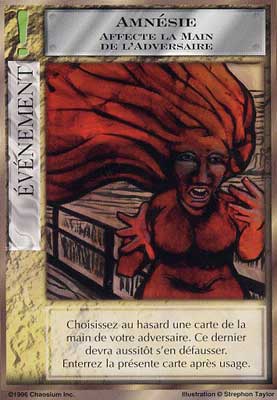
Amnesia is most dangerous
for spellcasters.
Every time
the character attempts to CAST a spell, there is a 50%
chance that he or she will
find the spell gone from his or her
memory, in which case it
cannot be recalled until the character
memorizes it again. Weapon
proficiencies may also be forgotten,
although the character may
re-roll to see if the proficiency
is remembered each morning.
23. Anorexia:
An anorexic character will refuse all forms of food
or nourishment and, if force
fed, there is a 50% chance that he
or she will induce vomiting.
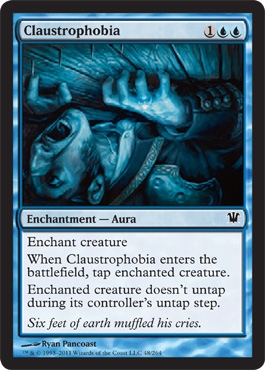
Particularly difficult in
dungeons,
claustrophobia
is the opposite of agoraphobia.
The claustrophobic
individual will not willingly
venture into enclosed spaces and
will fight to escape them.
If in an enclosed space, there is a
50% chance that the sufferer
will become violent.
25. Dementia:
The insane character loses 1d6 points each of INT,
WIS and CHA.
26. Phobia:
The character suffers from a strong and completely
irrational fear of some
substance, creature, or situation.